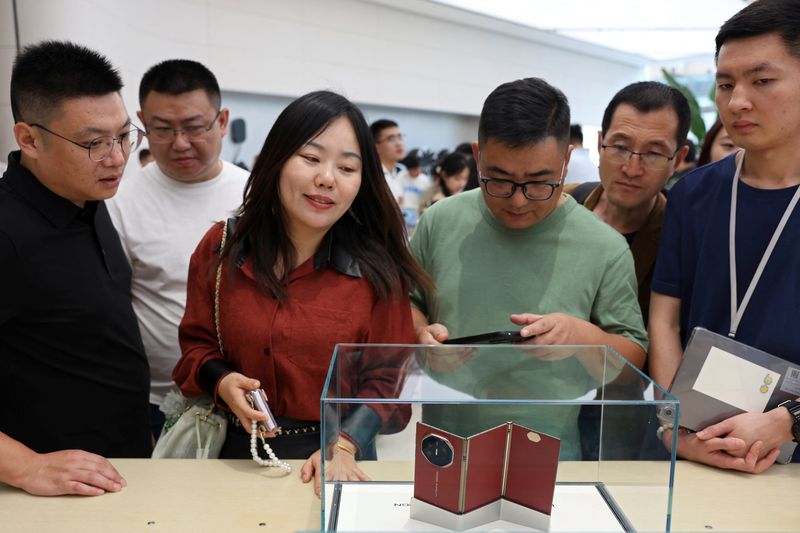By David Kirton
SHENZHEN, China (Reuters) – Huawei and Apple's latest smartphones went on sale in China on Friday, leaving many fans of the Chinese company disappointed that the long-awaited $2,800 phone, more than twice the price of the iPhone 16 Pro Max, was not available to regular customers.
At Huawei's flagship store in the southern Chinese city of Shenzhen, some who called themselves “Huawei superfans” reacted with irritation when they were told that only people whose pre-orders had been confirmed could buy the new, tri-fold Mate XT.
“I have been here since 10pm last night because this tri-fold phone is a first and I am happy to support our country,” said a student surnamed Ye.
“But this is very disappointing. They should have made it clear that we cannot buy.”
A similar story unfolded at Huawei’s Wangfujing store in Beijing, where consumers were told that only those whose pre-orders had been confirmed could buy the long-awaited phone. The phone can be folded in three ways, like an accordion door.
A customer surnamed Rui who got to try out the Mate XT in Shenzhen said: “I wanted to see what all the fuss was about, but it's a bit big and not really that practical.”
The disappointment came after some analysts warned that supply chain constraints could leave many potential buyers of Huawei's Mate XT empty-handed, while others raised doubts about the phone's high cost in a slump economy.
Although Huawei CEO Richard Yu said at the unveiling of the Mate XT this month that the company had “turned science fiction into reality”, owning the phone remains a fantasy for many.
Pre-orders for the Mate XT have surpassed 6.5 million, nearly double the roughly 3.9 million foldable smartphones that shipped globally in the second quarter of this year, according to consulting firm IDC. “Pre-ordering” does not require consumers to pay a deposit. Huawei did not say how many phones have been produced so far or how many customers would receive the Mate XT on launch day. Apple did not respond to a request for comment on how many new iPhones were on sale in China on Friday.
At the Huaqiangbei electronics market in Shenzhen, a phone vendor was selling the most expensive version of the Mate XT, with the largest memory, for 150,000 yuan ($21,290), compared with its retail price of 23,999 yuan, while the $2,800 model was listed for more than $4,000.
When asked if she had sold one yet, she replied, “Some people have asked for it, but it's way too expensive.”
APPLE NEEDS CHINESE AI PARTNER
While Apple has enjoyed strong demand in China for years, where the launch of new iPhones once generated excitement, sales have now declined and the company's quarterly ranking of second in the global economy has fallen from third to sixth.
Apple’s launch of a new smartphone in China is being overshadowed by the fact that the company has yet to announce an AI partner in the country that can power the 16s. What’s more, Apple Intelligence, Apple’s AI software, will only be available in Chinese next year.
Some Apple fans said the AI challenge wasn't a problem.
“The lack of AI in iPhones isn’t a big deal for me right now as it’s more of a gimmick,” said a customer surnamed Shi who upgrades his iPhone annually.
Shi said of Huawei's new offering that it is too expensive and “not for the average customer.”
Huawei has garnered a lot of support from patriots in China, with fans impressed by the way the company has managed to circumvent years of U.S. export restrictions that initially crippled the company’s smartphone business.
The launch of the Mate XT, which analysts say will have a locally produced chipset, highlights Huawei's ability to circumvent US sanctions. However, the company's ability to mass produce remains a major concern.
According to Lori Chang, senior analyst at Isaiah Research, key components of the Huawei Mate XT, including the panel, glass lid, and hinges, may face manufacturing issues.
($1 = 7.0460 yuan)
(Reporting by David Kirton in Shenzhen, additional reporting by Liam Mo in Beijing; Editing by Anne Marie Roantree and Sonali Paul)

